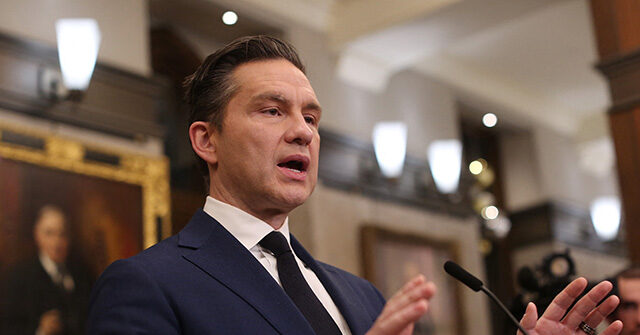On Friday, Pierre Poilievre, the leader of the Conservative Party of Canada, delivered a scathing critique of Jagmeet Singh, the head of the New Democratic Party (NDP), for his apparent hypocrisy in criticizing Prime Minister Justin Trudeau. Singh presented himself as a vociferous opponent of Trudeau, claiming that the Prime Minister had failed in his duties, specifically stating that Trudeau “failed in the biggest job a Prime Minister has: to work for people, not the powerful.” Singh expressed his intention for the NDP to vote down Trudeau’s government, arguing that it was time for Canadians to have the chance to elect a government that prioritizes their needs. In an open letter, he elaborated on his call for Trudeau’s resignation, citing vital issues such as health care, affordable housing, and inflation that had remained unaddressed during Trudeau’s tenure.
Despite Singh’s firebrand rhetoric, Poilievre was quick to point out that Singh had previously enabled Trudeau by avoiding crucial votes that could have initiated the Prime Minister’s ouster, deeming Singh’s current stance as merely lip service. Poilievre reminded the public of Singh’s similar empty promises in September, where he claimed he would no longer support Trudeau but later voted multiple times against triggering an election. The Conservative leader emphasized that Singh’s recent actions contradicted his words; had he voted differently, an election could have already been underway. Poilievre positioned the Conservatives as the only credible alternative to what he referred to as the “costly NDP-Liberal clown show,” while highlighting the NDP’s role in permitting Trudeau’s continuation in office amidst political turmoil.
The political landscape within Canada seems increasingly strained, especially for the Liberals under Trudeau’s leadership, which has witnessed a significant decline in popularity. This drop became evident when the Conservatives secured a surprising victory in a traditionally Liberal stronghold, prompting more calls for Trudeau’s resignation from within his party. This turmoil intensified following the resignation of Trudeau’s finance minister, Chrystia Freeland, who had voiced concerns over the government’s spending behavior and its ability to handle an impending trade war with then-President-elect Donald Trump. As the opposition capitalized on Trudeau’s beleaguered leadership, Poilievre asserted that the NDP had acted to protect Trudeau, rather than genuinely attempting to remove him from power through confidence votes.
Singh’s shifting stance became more evident as he struggled to balance the demands of his party members while negotiating the complex dynamics of coalition politics. Initially signaling a willingness to bring down Trudeau, he backtracked with vague comments about not being able to commit to firm decisions, underscoring the uncertainty surrounding parliamentary sessions and potential motions of non-confidence. Poilievre criticized Singh for this lack of commitment, imploring him to act decisively against Trudeau’s administration rather than waiting for the political climate to shift. Singh attempted to justify his more cautious approach by pointing to the intricacies of the political chess game at hand, arguing that the immediate priority should be addressing the incoming threats posed by Trump rather than focusing solely on Trudeau’s exit.
The dramatic shifts in Singh’s messaging drew confusion not just from the Conservative camp but also from several internal NDP stakeholders and disillusioned Liberals alike. Critics from these factions pointed out how Singh’s indecision on the confidence motion risked prolonging Trudeau’s leadership, which many saw as detrimental to their political futures. Liberal MP Wayne Long even called upon his compatriots to consider whether going into a February election under an unpopular leader, like Trudeau, was prudent or if they should pressure for a change that could lead to a stronger contender by the following October. The implications of Singh’s indecision became a focal point as it revealed the internal rifts within left-leaning parties, even as they tried to form a united front against the Conservatives.
Adding another layer of complexity, Poilievre hinted that Singh’s motives might be more self-serving, implying that his reluctance to hold a confidence vote could be tied to personal concerns over his own political future and pension eligibility, especially if an election were to be called suddenly. While NDP supporters deflected these allegations by attempting to compare the pension stakes with Poilievre’s, the overall narrative illustrated the precarious balance Singh must maintain in a volatile political environment. It also highlighted the broader issues of leadership credibility and accountability, which become ever more vital as political tensions heighten around key issues affecting Canadians directly.
As the situation unfolded, Trudeau’s administration signaled its resolve to withstand the growing political pressures, even moving forward with a cabinet shuffle designed to prop up his leadership. Dominic LeBlanc, who stepped in as finance minister, affirmed that Trudeau retained the full backing of his Cabinet while acknowledging the dissenting voices within the party advocating for change. Simultaneously, Communications began portraying Trudeau as reflective and mindful of the concerns raised within his party, with various members calling for patience and suggesting that time for contemplation might yield beneficial results. In this backdrop of heightened political uncertainty and strategizing, the stage appeared set for significant electoral battles ahead, with each party vying for dominance against the backdrop of a skeptical electorate.

